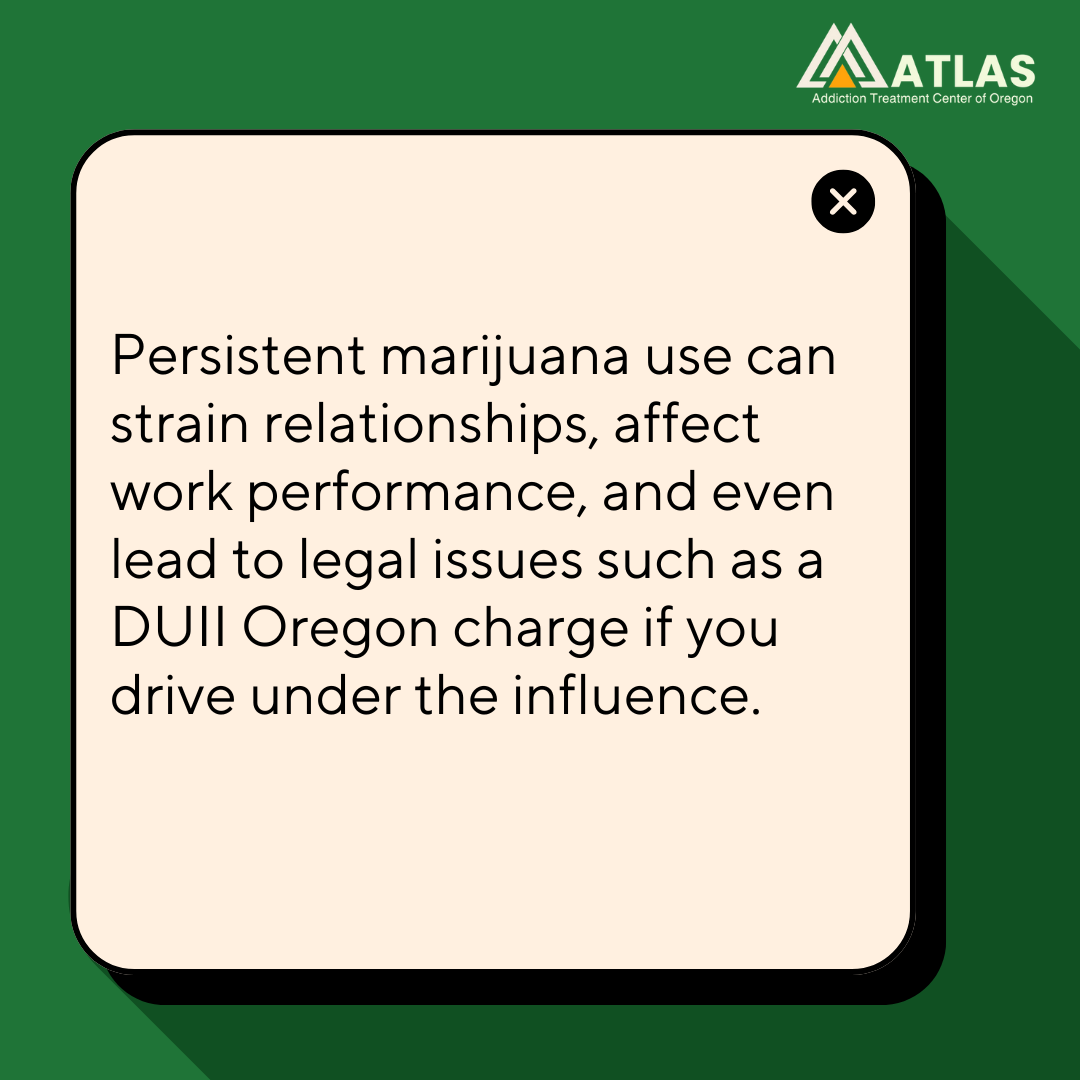.png)
It’s no secret that marijuana has become more mainstream than ever. From recreational dispensaries on every corner to conversations about its “harmless” reputation, cannabis use is often seen as casual and consequence-free.
But behind the growing normalization, drug treatment centers in Oregon are witnessing a different side of the story. And it’s one where increased accessibility has led to rising dependency issues, mental health challenges, and struggles with motivation and focus.
In this blog, we’ll explore what treatment specialists are seeing across Oregon, the real risks of marijuana use that often go unnoticed, and why understanding these effects matters for both individuals and families trying to navigate the blurred line between use and misuse.

Marijuana use has become increasingly common in Oregon, especially since legalization made it easy to access and socially acceptable. According to 2023 data, 23.65% of adults in Oregon have used cannabis in the past year.
But while it’s legal, that doesn’t mean it’s risk-free.
Many people underestimate how regular use can affect both health and daily functioning, and weed rehab programs are starting to see more individuals struggling to cut back or stop altogether.
Physically, marijuana use can harm more than just your lungs. Smoking or vaping can irritate the respiratory system, while long-term use has been linked to cognitive changes like slower reaction times, difficulty focusing, and reduced memory function. Dependence can develop gradually, making it tough to go without the drug even when you want to.
The mental health effects can be just as significant. Frequent marijuana use has been connected to increased anxiety, depression, and — in some cases — psychosis, especially in people with underlying vulnerabilities.
Long-term use can also dull motivation and impact memory, making it harder to stay consistent with work, school, or relationships.
Professionals at drug treatment centers in Oregon are at the forefront when it comes to witnessing how marijuana dependency is becoming a growing concern.
While not everyone who uses marijuana develops a problem, many clients come in surprised by how hard it is to quit once regular use turns into daily dependence. Counselors and clinicians are noting a steady rise in cases where marijuana use starts affecting sleep, mood, and motivation long before people realize it’s become an issue.
One noticeable trend is the increase in young adults seeking help. Many began using marijuana casually in high school or college and didn’t recognize the shift from social use to reliance. For some, it starts interfering with work, education, and relationships, creating a cycle of low motivation and emotional fatigue that’s tough to break without support.
Treatment professionals also report a strong link between marijuana misuse and co-occurring mental health disorders such as anxiety, depression, or trauma-related issues. These conditions often feed into one another, with individuals using marijuana to self-medicate only to find their symptoms worsening over time.
That’s why addiction treatment Oregon focuses on personalized care. This tailored approach helps clients not only stop using but also rebuild balance, confidence, and a clear sense of purpose beyond marijuana use.

For many people, weed starts as something casual. It could be a way to relax, sleep better, or take the edge off after a long day. But when it becomes something you need rather than something you choose, that’s when use starts crossing into addiction territory.
Recognizing these signs early can help you take back control before weed takes control of you:
These patterns often mark the shift from casual use to physical dependence.
If not addressed, your body builds tolerance, meaning you need more weed to feel the same effects. And when you try to stop, withdrawal symptoms like irritability, insomnia, or loss of appetite can set in. These physical and emotional responses make it even harder to quit without support.
The effects often reach beyond your personal health. Persistent marijuana use can strain relationships, affect work performance, and even lead to legal issues such as a DUII Oregon charge if you drive under the influence. These consequences can add layers of stress and isolation that reinforce the cycle of use, making professional help an important step toward recovery and stability.

Across the state, drug treatment centers in Oregon offer a wide range of options to help you recover from marijuana dependence and rebuild healthier habits. And many of these programs are covered by the Oregon Health Plan (OHP), the state’s medical assistance program.
If you need a balance between treatment and daily responsibilities, outpatient support is a great place to start. These programs, often provided through community-based addiction treatment centers, include counseling, education, and relapse prevention strategies — all while allowing you to continue working, studying, or caring for your family.
If you need a higher level of care, inpatient and residential programs offer safe, round-the-clock treatment environments. These programs, including options at an addiction treatment center covered by OHP, give you time away from triggers while providing medical supervision, therapy, and support.
Now, if you require structured treatment but can’t pause your life completely, an intensive outpatient program (IOP) bridges the gap. IOPs offer multiple therapy sessions per week with flexibility for work or school schedules.
Most Oregon programs also incorporate specialized therapies such as cognitive behavioral therapy (CBT), group therapy, mindfulness, and peer support. These evidence-based approaches help address both substance use and the underlying emotions or mental health challenges that often come with it.
Additionally, DUII education and diversion programs in the state play a key role in helping individuals who’ve faced legal consequences related to marijuana or other substances. These programs focus on accountability, safe decision-making, and preventing future offenses.
Getting help for addiction shouldn’t depend on your income or insurance status. And in Oregon, it doesn’t have to.
The OHP makes treatment more accessible by covering a wide range of recovery services, from outpatient therapy to residential care. This means you can find an addiction inpatient treatment center covered by OHP that provides the structure and medical support needed to start your recovery journey safely.
For individuals and families looking for care, it’s easier than ever to locate an OHP-covered facility in your community. Many local providers work directly with OHP to ensure costs are minimized or fully covered, helping you focus on healing rather than worrying about expenses. These centers often have staff dedicated to helping clients navigate coverage, verify eligibility, and get connected to the right level of care.
Oregon’s focus on expanding coverage and community-based recovery programs is also helping remove long-standing barriers to treatment. Between Medicaid, private insurance options, and local peer support networks, there are more resources than ever to make recovery possible for everyone.

While marijuana use may seem harmless to many, its risks are real. These risks include dependency, mental health challenges, and long-term effects on motivation, memory, and overall well-being.
The truth is, once casual use turns into a daily habit, quitting alone can be tougher than most people expect. That’s why reaching out for professional guidance can make all the difference.
Local drug treatment centers in Oregon are seeing more people take that brave first step toward recovery and finding real results through quality care. Whether you’re struggling yourself or worried about someone you love, support is available. And if you’re ready to make a change, feel free to contact us at Atlas Treatment Center. Our admission team can help you find the best program for your needs, answer your questions, and walk you through the recovery process with understanding and care.

Author
Emmy is a content specialist dedicated to helping brands boost their online presence and reputation through tailored, well-researched copy. With expertise across diverse niches—including mental health—she crafts messages that resonate with target audiences.


.webp)
Don't let addiction define your future. We're ready to support you every step of the way. Reach out to us for a free, confidential assessment.

